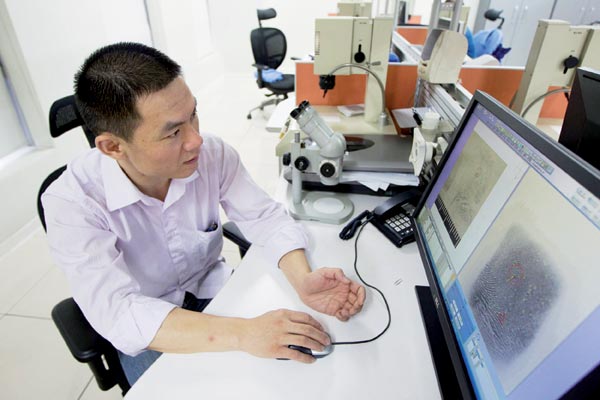The man who seeks clues in fingerprints
Updated: 2012-07-11 10:36
By Zhou Wenting in Shanghai (China Daily)
|
|||||||||||
 |
|
Liu Zhixiong compares fingerprints found at crime scenes with records in the database. Gao Erqiang / China Daily |
Liu Zhixiong recently created a stir after he identified a fingerprint, which helped police solve a 31-year-old serial electric shock murder case.
Convicts have criminal records, which makes identification of fingerprints possible, explains Liu, a police officer in the fingerprint identification lab of the criminal investigation brigade in Shanghai.
"Only the fingerprints of those with criminal records are in the database," says Liu, whose daily task is to compare dozens of fingerprints found at crime scenes with records in the database.
"Every fingerprint carries more than 100 distinctive characters, which makes it the first physical evidence in a crime investigation," Liu says. "Everybody's fingerprints are unique and remain unchanged for a lifetime."
The 43-year-old who graduated from Shanghai Police College in 1990, used to manually match fingerprints using magnifiers, as all the records were in hard copy form.
"At that time, the system wasn't computerized," Liu says. "We compared each fingerprint with hundreds and thousands of documents, which was like looking for a pin in a haystack."
Then, it was considered a merit achievement if the fingerprint identification lab made four matches a year, Liu adds. But with the latest technology, the lab is able to match about 3,000 fingerprints annually.
Before Liu starts work on each case, he finds out about the facts of the case and the details of a crime scene from the policemen involved.
"If the policemen tell me they believe the fingerprint on a desk is left by the index finger of the right hand, I can narrow the scope of my work from 10 to one finger, and that increases the probability of a successful match," Liu says.
But the job remains a challenge as most of the time the fingerprints found at crime scenes are fragmented.
Repetitive checks for matches are necessary, which is why Liu says his eyesight has deteriorated.
"My eyes start to tear when I concentrate on the computer screen for too long," he says, adding that he stays away from the computer and TV after work.
"Doctors have advised me to go for a thorough eye check, but I know what I need most is rest. If I can be off peering at fingerprints for a month or two, I'm sure my eyesight will improve."
Now, he tries to keep a distance from the screen at work. "But whenever a major case comes, I find myself moving closer to the screen unconsciously."
What has been his most impressive case? Liu says it has to be the first case he solved using the computer system in 2000.
"The burglar disguised himself as a repairman from a gas company and killed a woman who was seven months pregnant and a 14-year-old girl," he recalls. "It was at about the same time that my wife gave birth to our daughter."
As a father, the case was a wake-up call for him.
"I realized the importance of telling my daughter to be more aware of her surroundings and to stay safe. For example, I tell her to be aware of exit signs and emergency escape routes when taking subways and to keep a distance from those with an abnormal look or who behave strangely," Liu says.
Sometimes, Liu's friends ask him to check their fingerprints out of curiosity about his work.
"I usually decline by joking that they are seeking bad luck. All the fingerprints I observe are that of evildoers," he says.
Contact the writer at zhouwenting@chinadaily.com.cn
Related Stories
Fingerprints' secrets 2012-06-15 13:07
Brit crime thriller almost pays off 2012-03-16 10:13
Police found no evidence Lohan hit club manager 2012-05-06 17:13
Police to question Houston's assistant? 2012-03-30 13:31
Today's Top News
Rescuers race against time for quake victims
Telecom workers restore links
Coal mine blast kills 18 in Jilin
Intl scholarship puts China on the map
More bird flu patients discharged
Gold loses sheen, but still a safe bet
US 'turns blind eye to human rights'
Telecom workers restore links
Hot Topics
Lunar probe , China growth forecasts, Emission rules get tougher, China seen through 'colored lens', International board,
Editor's Picks

|

|

|

|

|

|





